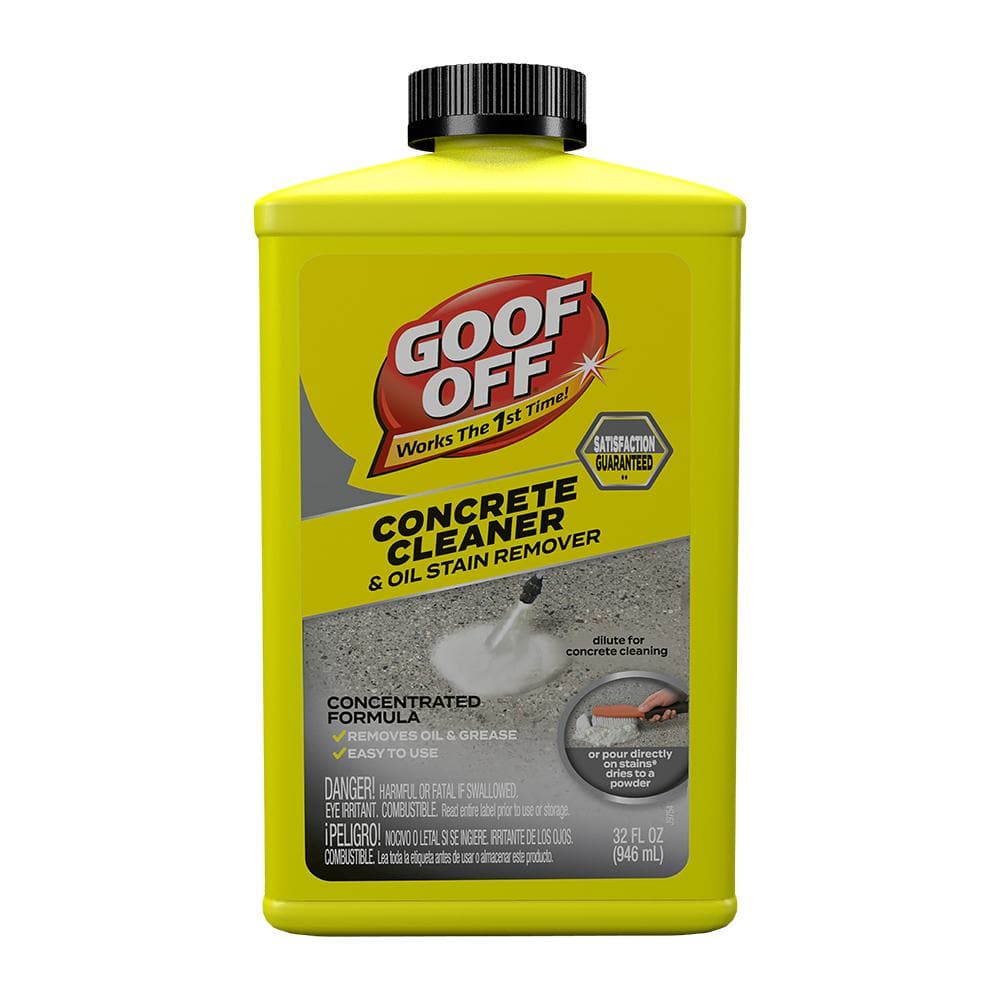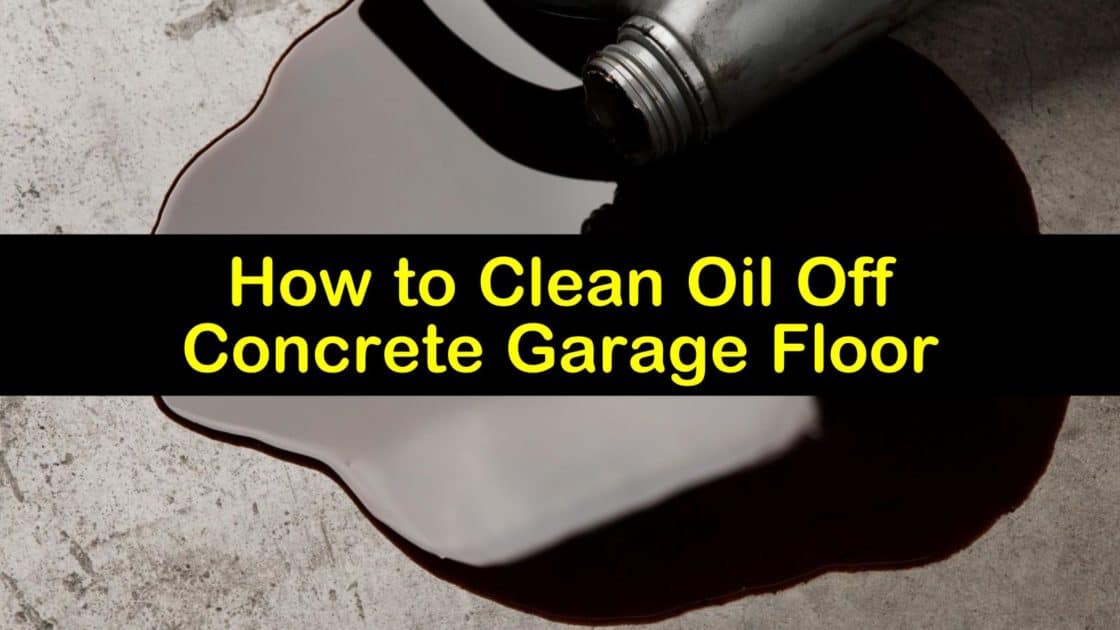Have you ever walked into your garage and been met with the unmistakable slickness of oil? Perhaps it’s from your car, a leaky lawnmower, or maybe even a spilled bottle of motor oil. No matter the source, oil stains on your concrete garage floor can be a real eyesore and even a safety hazard. But fear not, you don’t have to resign yourself to a greasy garage floor forever!

Image: www.wranglerforum.com
This comprehensive guide will walk you through the process of removing oil from your concrete garage floor, offering effective strategies and actionable tips that will have your garage looking clean and pristine in no time.
Understanding the Problem: Why Oil Stains Concrete
Oil and concrete are not the best of friends. Oil is a hydrophobic substance, meaning it repels water. Concrete, on the other hand, is porous and absorbs liquids. When oil comes into contact with concrete, it seeps into the pores, leaving behind a stubborn stain.
The Right Approach: Choose Your Cleaning Strategy
Choosing the right cleaning method depends on the age and severity of the stain. For fresh, light stains, simple household products might be sufficient. However, older, deeply embedded stains will require more intensive solutions. Here’s a breakdown of different approaches to tackle oil stains:
Quick and Easy Cleaning for Fresh Stains
-
Blot It Up: Fresh spills are easiest to address. Immediately blot the oil with a paper towel or absorbent cloth to soak up as much oil as possible.
-
Degreasing Power: For a bit more cleaning power, use a commercial degreaser or laundry detergent. These products will help break down the oil molecules and make them easier to remove. Apply the degreaser directly to the stain, let it sit for a few minutes, and then scrub gently with a stiff-bristled brush. Rinse thoroughly with water.
-
Dish Soap and Baking Soda: A simple solution for lighter stains involves mixing dish soap with baking soda. This combination creates a paste that can effectively break down oil and grease. Apply the paste to the stain, let it sit for a few minutes, and then scrub with a stiff-bristled brush. Rinse thoroughly with water.

Image: www.tipsbulletin.com
Tackling Tougher Stains: Advanced Cleaning Methods
For oil stains that have had time to set in, it’s essential to utilize more robust cleaning agents and methods:
The Power of Absorbent Materials
-
Cat Litter: Cat litter is a highly absorbent material that can effectively soak up oil. Sprinkle a generous amount of cat litter onto the oil stain and let it sit overnight. The next morning, sweep up the absorbent cat litter and repeat if necessary.
-
Cornstarch: Similar to cat litter, cornstarch is a great absorbent. Sprinkle cornstarch over the oil stain, let it sit until the oil has been absorbed by the cornstarch, and then sweep the absorbent mixture away.
The Power of Chemicals: Dealing with Stubborn Stains
-
Commercial Oil Stain Remover: There are many commercial products specifically designed to remove oil stains from concrete. These products contain solvents that can effectively dissolve and lift oil. Follow the instructions on the product label carefully to ensure safe and effective use.
-
Mix of Vinegar and Baking Soda: This DIY solution is surprisingly effective. Mix white vinegar and baking soda into a thick paste, apply it to the stain, and let it sit for a few minutes. Then scrub thoroughly and rinse with water. Repeat if necessary.
-
Acetone: A powerful solvent, acetone can be effective for removing oil stains. However, it can also damage concrete surfaces. Use sparingly, and test the acetone in a discreet area first to ensure no discoloration occurs.
Beyond Cleaning: Preventing Future Oil Stains
-
Catch It Before It Drops: Properly dispose of used motor oil and other petroleum products to prevent them from spilling in your garage in the first place.
-
Keep a Clean Garage: Regular sweeping and cleaning will help prevent the buildup of oil and other debris that can lead to stains.
-
Spill Containment: Have spill-absorbing mats readily available in areas where oil or other liquids are likely to be spilled.
Expert Insights and Actionable Tips
From the Experts:
-
Kevin, a seasoned building maintenance professional, advises, “For persistent stains, a combination of cleaning methods is often most effective. Start with an absorbent material, followed by a degreaser or chemical treatment.”
-
Amelia, a certified environmental specialist, shares, “Remember to wear protective gear like gloves and a mask when working with chemicals. Proper ventilation is essential when using solvents or strong cleaners.”
Actionable Tips:
-
Test Any New Solution in an Inconspicuous Spot: Before applying any cleaning solutions to the entire stain, test it in a small area to ensure it won’t harm the concrete.
-
Don’t Overuse Water: Too much water can actually make oil stains worse by pushing the oil deeper into the concrete.
-
Be Patient: Removing oil stains may require multiple cleaning attempts. Be persistent and don’t give up.
How To Remove Oil From Concrete Garage Floor
Conclusion: Bringing Your Garage Back to its Former Glory
Removing oil stains from your concrete garage floor can be a rewarding undertaking. By understanding the different cleaning methods and applying them effectively, you can reclaim a clean and safe garage space. Remember, prevention is key, so make a conscious effort to prevent future spills and keep your garage floor clean. With a little effort, you can have a garage that you’re proud to show off.






